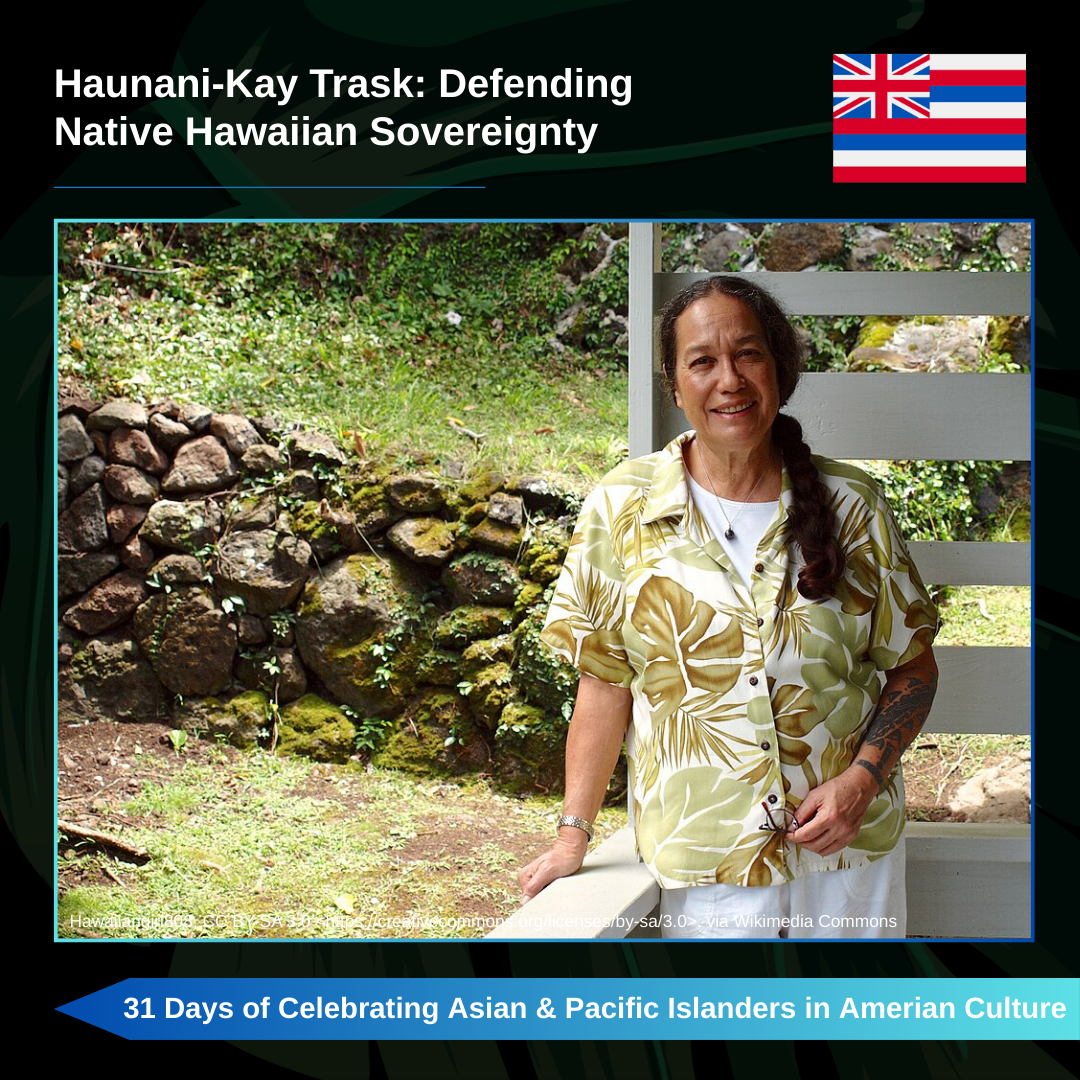Day 5. Haunani-Kay Trask Defending Native Hawaiian Sovereignty.

Today we lift up the life and legacy of Haunani-Kay Trask (1949–2021) — a brilliant scholar, fierce poet, and fearless activist whose work unapologetically championed the sovereignty, dignity, and cultural survival of the Native Hawaiian people.
As a leading voice in the Hawaiian sovereignty movement, Trask challenged settler colonial narratives that sought to erase Kanaka Maoli (Native Hawaiian) history and identity. Through her powerful writing, speeches, and activism, she called for a Hawai‘i for Hawaiians, where Indigenous rights, culture, and land were restored and protected.
“We are not American. We will die as Hawaiians. We will never be Americans.”
— Haunani-Kay Trask, 1993
Stories of Courage, Culture, and Resistance
Born and raised in Honolulu, Oʻahu, Trask grew up witnessing the effects of American colonialism on her homeland. After earning advanced degrees from the University of Wisconsin–Madison, she returned to Hawai‘i determined to reclaim Indigenous narratives.
Key contributions and moments:
- Co-founded Ka Lāhui Hawaiʻi, a Native Hawaiian sovereignty movement advocating for self-governance
- Authored “From a Native Daughter: Colonialism and Sovereignty in Hawai‘i” — a groundbreaking book deconstructing the tourism industry’s commodification of Hawaiian culture
- Served as Director of the Center for Hawaiian Studies at the University of Hawaiʻi at Mānoa, where she built an academic home for Indigenous scholarship
- Wrote “Light in the Crevice Never Seen”, a searing poetry collection celebrating Kanaka Maoli identity and resilience
- Consistently uplifted the interconnected struggles of Indigenous peoples across the Pacific and the globe
“Our people must be free to assert our culture, language, and identity in our own land. We must do this ourselves, for ourselves.”
— Haunani-Kay Trask
Resources to Learn More
To experience the depth and power of Trask’s work, here are some essential resources:
📖 From a Native Daughter: Colonialism and Sovereignty in Hawaiʻi (1993) — A must-read analysis of colonial power structures in Hawai‘i
📖 Light in the Crevice Never Seen (1994) — A collection of Trask’s political and cultural poetry
🎥 Act of War: The Overthrow of the Hawaiian Nation (1993) — A documentary narrated by Trask, detailing the 1893 US-backed overthrow of the Hawaiian Kingdom
🎓 Center for Hawaiian Studies at UH Mānoa — The academic institution Trask helped build to preserve and uplift Kanaka Maoli scholarship
Why Haunani-Kay Trask’s Story Matters
Trask’s unwavering clarity about colonial violence and Indigenous sovereignty remains vitally relevant today — not only for Hawaiʻi, but for Indigenous communities everywhere. She taught us:
- To center Indigenous voices in conversations about land, identity, and history
- That sovereignty is not just a legal issue, but a deeply cultural, spiritual, and ancestral one
- That true solidarity requires understanding how colonialism, capitalism, and militarism harm Indigenous communities worldwide
- Her life calls us to listen, learn, and act in solidarity with Native Hawaiian and Pacific Islander movements for justice.
Reflection
Let’s honor Haunani-Kay Trask by lifting up Indigenous voices and movements for sovereignty. We invite you to consider these questions as you reflect on Huanani-Kay’s impact.
💬 How can we be more inclusive of Hawaiian and Indigenous voices in our communities?
💬 What opportunities are there for us to engage with and learn from the Hawaiian Sovereignty movement?
Join us tomorrow as we explore the architecture of IM Pei.
Learn More: 🎙️ Ka Lāhui Hawaiʻi is the movement for Native Hawaiian self-determination. This online resource provides news, legal documents, and other updates on the goal of Hawaiian Soverignty.
Hashtags: #31DaysOfAPIHeritage #HaunaniKayTrask #HawaiianSovereignty #FromANativeDaughter #IndigenousPacific #AAPIHistory #LoveAsLiberation
Asian and Pacific Islander heritage is not monolithic. It stretches across dozens of nations, languages, histories, and spiritual traditions. In honoring these figures, we also honor the beautiful plurality of cultures, family traditions, and lived experiences that make up API communities in America.
For more information and access to other events, sign our Guestbook!
Discover more from SepulvedaUU
Subscribe to get the latest posts sent to your email.
